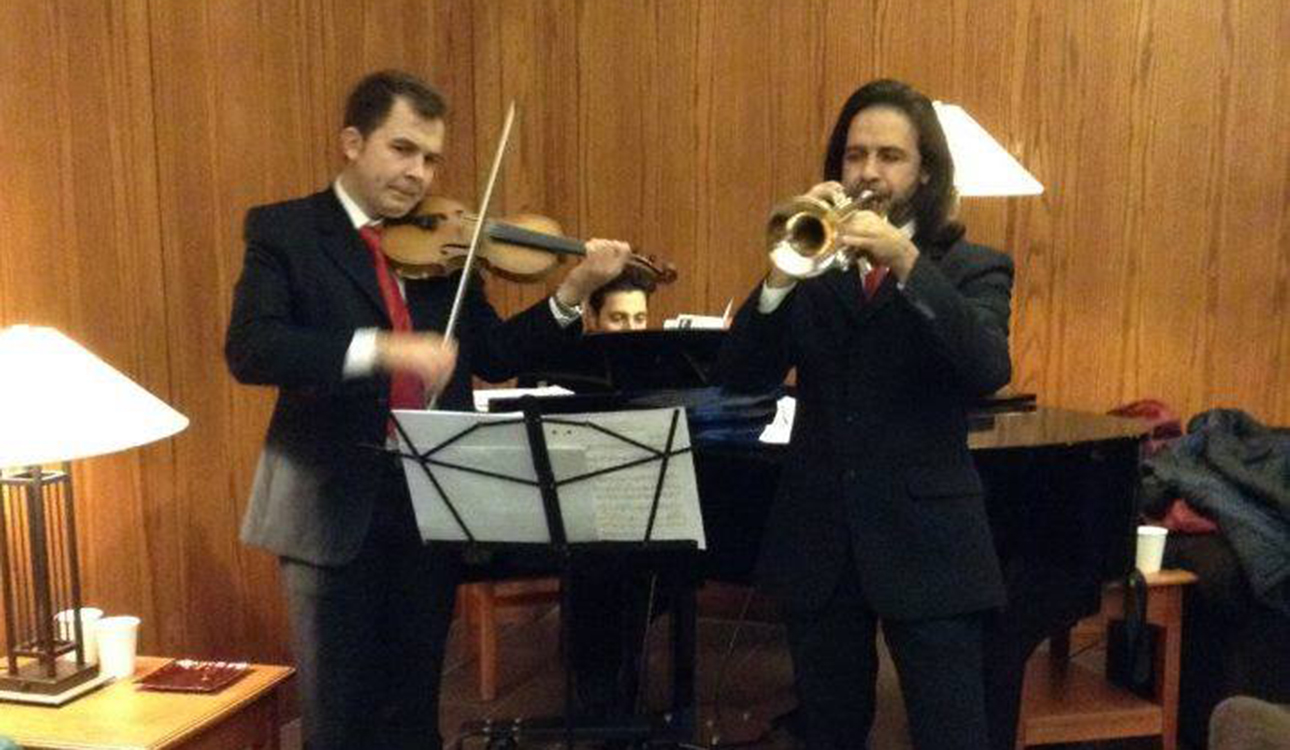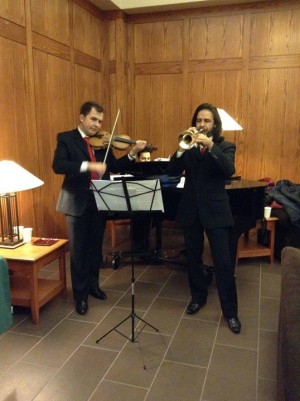

By Ian Currie
Reporter
Caratinga, Brazil, senior Humberto Araujo talks excitedly about his passion for music. Long black hair falls around his face, and his brown eyes are reached by his smile as he remembers his childhood in Brazil.
Araujo was born and raised in the small city of Caratinga, located in the state of Minais Derais north of Rio de Janeiro and Sau Paulo. In this small town, Araujo was first struck by a calling for music. He attended an extra curricular theory class and said he was immediately enraptured.
“Music came first at 11 years old,” Araujo said. “Ten minutes into my first theory class I knew I wanted this in my life.”
The only access the young boy had to learning music was through the state band, which was funded by local politicians and would play inaugurations and other similar ceremonies.
Araujo approached the conductor of the state band and begged him to teach him to play music.
“When he saw my excitement, he began to teach me,” Araujo said. “He really wanted to teach, and I really wanted to learn.”
The conductor, Milton Pires, taught Araujo individually in the mornings — Araujo was playing saxhorn, a valved brass instrument, at the time since it was the only instrument available — and then he would go to school during the day before attending the theory classes at night.
By age 12 he was playing in what he called the “old” state band. The band needed players, so the 12-year-old Araujo would spend his time practicing and performing with a band made up of 60- to 70-year-old men.
It was at this time that he first discovered the trumpet, which is now his instrument of choice.
“The trumpet had solo opportunities in the band, unlike the saxhorn, so they suggested I try it,” Araujo said.
Until the end of high school Araujo played in bands from all spheres of music. He sang in a rock band, played trumpet in a pop band and played solo and group material at various carnivals in the city. All the while he kept up various jobs to make extra money.
“I did whatever I could to play,” Araujo said. “I knew that music was my love.”
At the end of high school, Araujo was offered a job with a large Brazilian electrical company, which offered jobs to kids right out of high school.
“I took the job to help my family,” Araujo said. “We had the basics at home, nothing more, and they certainly couldn’t help me study music.”
Araujo described the company as the kind you never leave. He said people joined at 17 and would retire at 55. The job comes with a good salary, opportunity for growth and great benefits such as pension and health care.
Araujo rose through the company ranks quickly, beginning as an electrician. He was promoted numerous times until at 24 he was managing a group of 22 people, many of whom were decades his senior.
At the same time he studied at night and graduated with a degree in business administration at his local university, an endeavor that was sponsored by the company.
“While I was working with the company, while I was studying at night, I was still trying to think of a way I could come back to music,” Araujo said.
He moved up through the company’s ranks, always with one eye on his dream. In the company he started an improvisational theater group that traveled Brazil and performed at the company’s various national branches. The amateur group was a massive success, and a small way for him to keep in touch with his love of performance and arts, without earning any money.
Not only did his theater group have him traveling from city to city, his job as a manager did too. He commuted across Brazil for training seminars. One on of these commutes, he missed his bus back home.
He found his way onto another bus where he spent the next five hours chatting to a theater student who studied at the Palácio das Artes in Belo Horizonte, the state’s capital city.
After hearing about his improv group, she said to him, “Humberto, you have to go to my school.”
So Araujo went to the school’s office at 25 years old wearing his electrician’s uniform and told them he wanted to study music.
Despite his age, since most students were 16 and 17 years old, the dean of the school gave him a chance to study.
After speaking with his boss, Araujo was able to transfer to a big city, with one caveat — he had to start from the bottom as an electrician again, which meant longer hours. He couldn’t balance work and study, and he couldn’t attend all his classes.
He stopped studying at the Palacia Des Artes after a year.
He stayed in the capital, working during the day and playing gigs at night in bars and accompanying singers. He even got a few gigs that were nationally televised in Brazil.
At the time, Araujo said he was making good money. Electrician by day, musician by night.
Araujo was in Belo Horizonte, and felt like his music development had stalled. He called the State University looking for a trumpet teacher, and famous Brazilian trumpeter Anor Luciano answered the phone.
After a brief conversation in which Araujo discussed his history, Luciano took him under his wing, began to teach him and inserted Araujo into the University band.
He got in, but said he again struggled to cope with studies. He was working for the company and taking a really tough music course, so he decided to take a leap of faith. He had saved all he could for five years to help pay for living expenses and studies. He quit the job that no one quits to pursue music.
Araujo was awarded two scholarships to study musical performance at Baylor. One scholarship came through Brazil’s national government study abroad program and another was a university-to-university exchange scholarship.
Araujo said Baylor’s programs tie in with his desire to develop as a player while working with others.
“I’ve always believed that together you can go further,” Araujo said.
Araujo is a rarity on campus, a 38-year-old undergraduate student.
“He is so cool, he is so comfortable with himself,” said Gaby Olag, a graduate student form Escondido, Calif.
Olag sees many similarities between graduate students commitment to their subject and Araujo’s commitment to music.
“When he opens up a little bit more you discover he takes music very seriously,” Olag said. “He takes a lot of time to practice and polish his skill.”
Araujo said he hopes to someday teach music to children in Cataringa, to show them that pursuing the arts is a possibility.
You can see how happy it makes him.
“It is my calling,” Araujo said.





